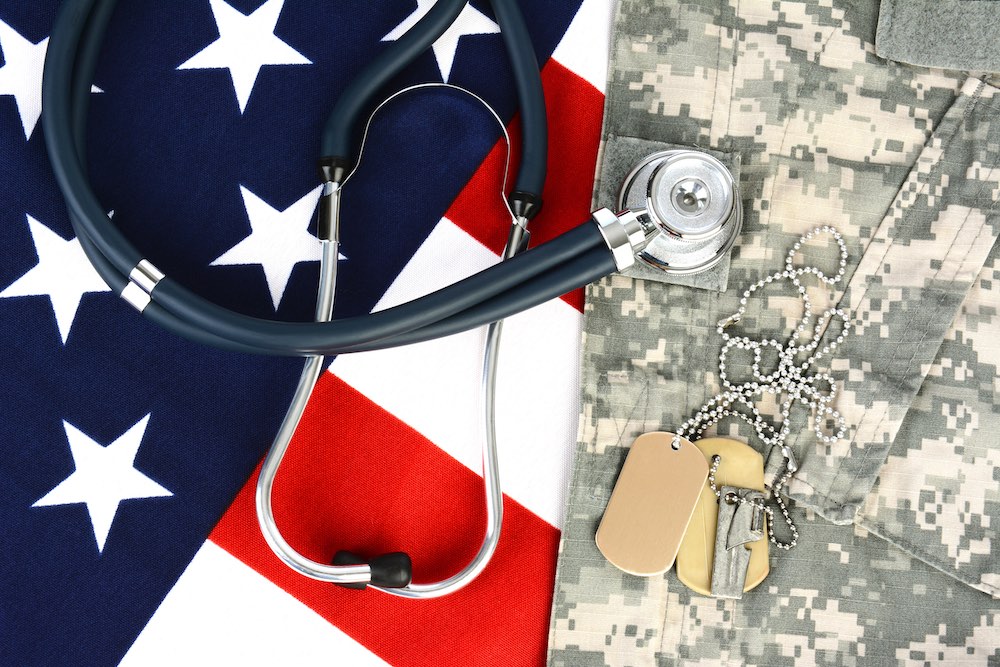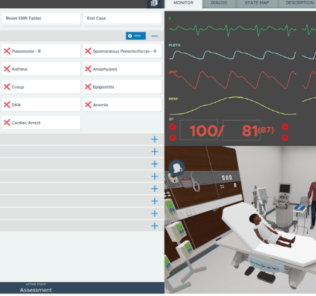Honoring Memorial Day with These Helpful Armed Services Medical Simulation Resources
HealthySimulation.com honors Memorial Day in the United States this week by sharing key articles, webinars and resources geared towards those serving in the Armed Services. Medical professionals serving in the U.S. Military, but also civil servants, will benefit from the clinical simulation resources shared here which specifically relate to the use and application of healthcare simulation methodologies and technologies with unique connection to austere environments, Tactical Combat Casulty Care (TCCC), military use of simulated processes, research tools and more. Have other resources to share here? Email us and we will take a look!
Military or Austere Environment Medical Simulation Webinars
- TraumaSIM’s Introduction to Moulage Course & Optional Kit: Learn the art of creating high-fidelity healthcare simulation wounds and injuries with this 3 CE hour introductory moulage course workshop with hands-on training moulage kit* shipped right to your door! This mix of online instruction and in-person hands-on materials will show you how to safely apply bruises, shock & cyanosis, burns, open fractures and lacerations safely to your Standardized (Simulated) patients and/or manikins.
- Stop The Bleed: Realistic Trauma Intervention Training Tools: This medical simulation webinar will showcase “Stop the Bleed” training technologies available from TacMed Solutions.
- VRpatients: A Trauma-Enabled Virtual Reality Platform for Nursing and EMS:
- Serve & Protect: K9 Simulation for Police Dogs Injured in the Line of Duty: Learn how to develop and implement an EMS K9 simulation program for police dogs injured in the line of duty.
- Medic! The Latest in Trauma Simulator Innovation from TacMed Solutions:This webinar will explore TacMed’s highest-fidelity human trauma patient simulator, the Clinical Response Whole Body System, and TacMed’s K9 trauma simulator.
- Trauma Simulators: What is the Right Manikin Fidelity for Us? Join TacMed’s medial simulation experts and customers at EMS World as they compare TMS’s moderate and high-fidelity trauma simulators against training needs.
- Competency Based Experiential Learning and the Role of Simulation, Data and Learning Engineering at the US Army: Streamed live from International Pediatric Simulation Society Workshop 2023 in Lisbon: A keynote presentation discussion on adaptive training, intelligent tutoring, and learning engineering principles to drive next generation training and simulation.
- How to Maintain Patient Safety During a Pandemic: Positive Lessons from the VA: In this highly acclaimed CE presentation, Suzanne Gordon will explain the critical actions the VA took during COVID19 to make patients and staff safe.
- Getting Results from Trauma Simulation: Training the Continuum of Care: Tactical Medicine experts will share simulation and curriculum design techniques designed to maximize trauma training from point of injury to the trauma bay.
Key Articles and Pages Dedicated to Military Healthcare Simulation
Sponsored Content:
VHA SimLEARN Program Uses Healthcare Simulation to Improve Veteran Care: As the use and popularity of medical simulation expands across the world, even government agencies are beginning to utilize the practice within their respective departments. Today, this can be said for the Veterans Health Administration (VHA), the largest integrated health care system in the United States. As part of the Office of Healthcare Innovation and Learning, the VHA developed a Simulation Learning, Evaluation, Assessment, and Research Network (SimLEARN) program. This HealthySimulation.com article shares an interview with Eric Bruns, MBA, the executive director of the Simulation Learning, Evaluation, Assessment and Research Network (SimLEARN), discussing the program’s mission and impact.
U.S. DoD JETS Project Connects Multiple Commercial Clinical Simulation Systems Under One Dashboard: For years the United States military has been utilizing clinical simulation to help education and train service members and contractors. Specifically, as medical simulation has continued to evolve, the use of this training methodology has enabled these professionals to become better prepared in the event of a healthcare emergency. This HealthySimulation.com article shares how the United States Department of Defense is employing a particular project to connect multiple commercial clinical simulation systems under one dashboard. Through the use of this program, many digital training opportunities have come to fruition.
U.S. Navy Trusts Simulation So Much, They Built Their Own Ocean: The U.S. Military spares no expense when the opportunity to learn from real world environments in controlled, predictable, repeatable, and experimental ways. With a budget that dwarfs healthcare simulation, the consistent end result for ROI on training is always, consistently, 100%: simulate. It should be no surprise then, that the U.S. Navy has their own “ocean”. Originally built in 1962, MASK is supported by over 3,600 scientists, engineers, and technicians the space was upgraded in 2013 with finger-like technologies to better mimic water conditions.
Military Healthcare Simulation Page: Military healthcare simulation is a type of clinical simulation that uses education and training principles to help members of the military and related professionals gain the skills needed in the field. Often, this guidance comes in the form of military combat simulation training, which can be accomplished in a number of ways. From the use of virtual reality simulation headsets to manikins and standardized patients, military simulation is able to create realistic scenarios that military personnel must be ready and prepared for. These scenarios cover a wide range of experiences and focus relating to armed forces-based knowledge.
Sponsored Content:
Defense Health Agency’s MST PMO Works to Optimize Warfighter Readiness and Improve Healthcare with Simulation: While the use of healthcare simulation is often associated with clinical simulation centers, hospitals, and academic institutions, the United States government recognizes the importance of medical simulation as well. Specifically, the Medical Simulation and Training Program Management Office (MST PMO) enables the Defense Health Agency (DHA), military departments, and Combatant Commands to rapidly prototype and field medical training capabilities to military hospitals and across the range of military healthcare operations. This is in support of an integrated medical readiness posture throughout the Military Health System (MHS). This HealthySimulation.com article shares more about these initiatives and their importance.
Vcom3D Healthcare Simulation Technologies Fill Gaps in Medical Learning: As part of one company’s mission to develop innovative technology and products that aid learning and improve performance, Vcom3D provides immersive medical simulation and training systems. The company has been a leader in research, development, assessment, and transition of learning systems and technologies for the U.S. Military since 200, and continues to expand a research and development portfolio.
SimX’s Virtual Reality Medical Training for the Military: Introducing VALOR. SimX‘s answer to standardized operational medical training and readiness. The Virtual Advancement of Learning and Operational Readiness (VALOR) program was created to build the next generation of simulation training for military healthcare personnel using virtual reality. Developed with over $12M in DOD R&D dollars and now deployed at dozens of installations, the SimX Virtual Reality Medical Simulation System (VRMSS) enables high quality, repeatable, and accessible training for a wide array of realistic scenarios.
Past Present and Future of Simulation in Military Medicine: Written by Allison A. Eubanks, Keith Volner, Joseph O. Lopreiato., this research discusses the concept of modeling and simulation (M&S) has long been an integral part of war-fighter military training dating to before World War II when pilots and infantry soldiers would train with simulators and mockups to prepare for battle. Army and Navy aviators would practice flying in simulated cockpits.
An evaluation of high fidelity simulation using a human patient simulator in a new Diploma in Military Medical Care: The use of simulation in healthcare education has been extensively embraced over the past 20 years. Military Simulation enables the deliberate practice and allows for immersion in learning tasks. The practice also enables tasks to be structured in staged learning chunks and provides a controlled environment in which it is safe to learn from errors. This article evaluates the views of Irish Defence Force personnel participating in their first exposure to the Human Patient Simulator (HPS) in high-fidelity simulation scenarios with respect to its relevance, applicability, and acceptability as part of the Diploma in Military Medical Care.
5 Important Comparisons Between Military and Civilian Clinical Simulation: Since the development of more affordable patient simulators like the SimMan in the mid-90s, clinical simulation has successfully expanded across numerous disciplines and professions in healthcare. In 1999, the Uniformed Services University of the Health Sciences (USUHS), a graduate nursing school and military medical school, established the first medical simulation center specifically targeting medical education and training. The field of healthcare simulation would not be in use the same way today without the joint effort of military and civilian medicine. This HealthySimulation.com article will provide clinical simulation champions with the opportunity to consider the similarities and differences of working with clinical simulation in the military versus civilian spaces.
360-Immersive Videos Support Veteran Care Providers: There is a new immersive healthcare simulation solution available that hopes to use extended reality (XR) to help providers better care for U.S. Veterans. The University of Michigan’s Nursing in XR series has placed a focus on how to best care for Veterans from all branches of the military. The goal is to create opportunities to honor those who have served the United States Military, and the university’s resources will work to help those who work with Veterans learn best practices in communicating and delivering care across a variety of healthcare settings. This HealthySimulation.com article explains why this emphasis on veteran healthcare support is so important and highlights topics covered by the UM XR series.
Journal of Special Operations Medicine: The home for all of your tactical medical and Combat Casualty Care resources. The Journal of Special Operations Medicine (JSOM) was initiated in 2000 under the United States Special Operations Command Surgeon’s Office. Due to the 2011 DoD budget cuts, USSOCOM divested ownership of the JSOM so that it could continue to be published privately. The JSOM remains the only academic peer-reviewed journal devoted to Special Operations medicine and is indexed in the US National Library of Medicine’s PubMed.
Subscribe to HealthySimulation.com’s Newsletter for More Military Medical Simulation Content!
Lance Baily, BA, EMT-B, is the Founder / CEO of HealthySimulation.com, which he started in 2010 while serving as the Director of the Nevada System of Higher Education’s Clinical Simulation Center of Las Vegas. Lance also founded SimGHOSTS.org, the world’s only non-profit organization dedicated to supporting professionals operating healthcare simulation technologies. His co-edited Book: “Comprehensive Healthcare Simulation: Operations, Technology, and Innovative Practice” is cited as a key source for professional certification in the industry. Lance’s background also includes serving as a Simulation Technology Specialist for the LA Community College District, EMS fire fighting, Hollywood movie production, rescue diving, and global travel. He and his wife live with their two brilliant daughters and one crazy dachshund in Las Vegas, Nevada.
Sponsored Content:


















